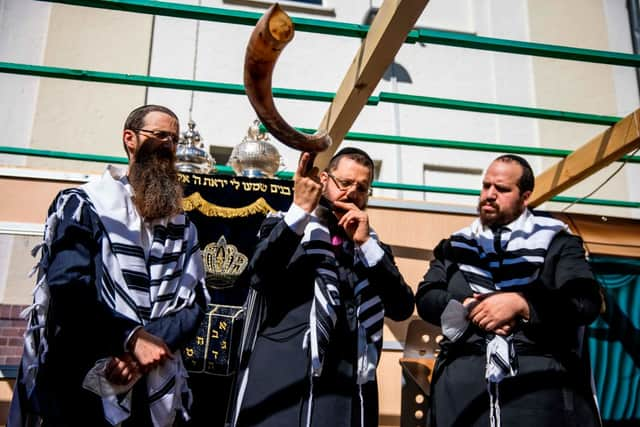Rosh Hashanah 2022: what is it, ‘Shana Tova’ meaning, greetings and Jewish New Year explained
and live on Freeview channel 276
Rosh Hashanah, also known as Jewish New Year, is one of the holiest days in Judaism, and means “head of the year” or “first of the year”.
This is everything you need to know.
What is Rosh Hashanah?
Rosh Hashanah is the Jewish New Year, and commemorates the date that Jewish people believe the world was created by God.
Advertisement
Hide AdAdvertisement
Hide AdRosh Hashanah also marks the beginning of something called the Days of Awe, which is a 10 day period of repentance which culminates in the holy fasting day of Yom Kippur.
It is a two day long festival that marks the anniversary of human creation, and celebrates the special relationship between people and God.
Liberal Judaism states on its website that in this post-agricultural society, Rosh Hashanah is a time to “gather our thoughts and contemplate spiritual renewal and a return to a path that is more in tune with what Jews believe that God requires of us”.
When is it?
The Jewish calendar is a “luni-solar” calendar which is established by the cycles of the moon and the sun.
Advertisement
Hide AdAdvertisement
Hide AdRosh Hashanah occurs on the first two days of Tishrei, which is the seventh month of the Hebrew calendar.
In 2022, it started on Sunday 25 September, and will end on the evening of Tuesday 27 September.
How is Rosh Hashanah celebrated?
There are lots of traditions that Jewish people observe when celebrating Rosh Hashanah - the main one being the sounding of the shofar, the ram’s horn, on both mornings of Rosh Hashanah.
Chabad explains that there are three types of shofar blowing, “tekiah, a long sob-like blast; shevarim, a series of three short wailes; and teruah, at least nine piercing staccato bursts”.
Advertisement
Hide AdAdvertisement
Hide AdThe blowing of the shofar is representative of the trumpets sounded at a king’s coronation, which is relevant as Rosh Hashanah is a day when Jewish people “proclaim God King of the Universe”, according to Chabad.


The ram’s horn itself is linked to the Binding of Isaac, an event which happened on Rosh Hashanah in which a ram took the place of Isaac as an offering to God.
The traditional way to wish someone a “Happy New Year” in Hebrew is by saying “Shana Tova”.
No work is permitted on Rosh Hashanah, and many attend synagogue during the two days. Women and girls light candles on each evening of Rosh Hashanah, and recite blessings.
Advertisement
Hide AdAdvertisement
Hide AdAnother popular custom during Rosh Hashanah is Tashlikh, which means “casting off”. Tashlikh see’s Jewish people going to areas with flowing water, such as a creek or river, and emptying their pockets into the water. This act symbolises casting off their sins.
Small pieces of bread are commonly placed in pockets in order to be cast off.
Rosh Hashanah also brings with it traditional foods as well, such as eating apples dipped in honey, which acts as a symbol for wishing in a sweet new year. Bread is also dipped in honey as well for the same reason.
What did Joe Biden say?
President of the United States Joe Biden made a statement on Rosh Hashanah on Sunday 25 September.
Advertisement
Hide AdAdvertisement
Hide AdHe said: “This Rosh Hashanah, Jewish communities throughout America and across the globe will celebrate the birth of the world and the beginning of a new year. “With the piercing sound of the shofar and the sweetness of apples dipped in honey, the Jewish New Year ushers in a sacred time of reflection, repentance, and renewal. A time to pause and look inward. During these Days of Awe, we have the opportunity to ask what kind of person we want to be and how we have measured up. “Just as individuals can seek renewal, so too can nations. This past year has seen encouraging progress for our nation. More Americans are securing the dignity of a good-paying job. Fewer children are living in poverty. With COVID-19 no longer the same disruptive threat it was, families can once more gather around the Rosh Hashanah dinner table and sit together in their synagogues. “At the same time, we have much more work to do to realize the values that bind us as Americans and to restore the soul of our nation. In the coming year, we must not only look inward, but also look to each other. We must rebuild our communities through empathy and acts of kindness, bridging the gap between the world we see and the future we seek. “Jill and I offer our warmest wishes to everyone celebrating Rosh Hashanah in the United States, Israel, and around the world. May your prayers be heard and your faith revitalized—and may we all be inscribed in the Book of Life. Shana Tovah.”
Comment Guidelines
National World encourages reader discussion on our stories. User feedback, insights and back-and-forth exchanges add a rich layer of context to reporting. Please review our Community Guidelines before commenting.
